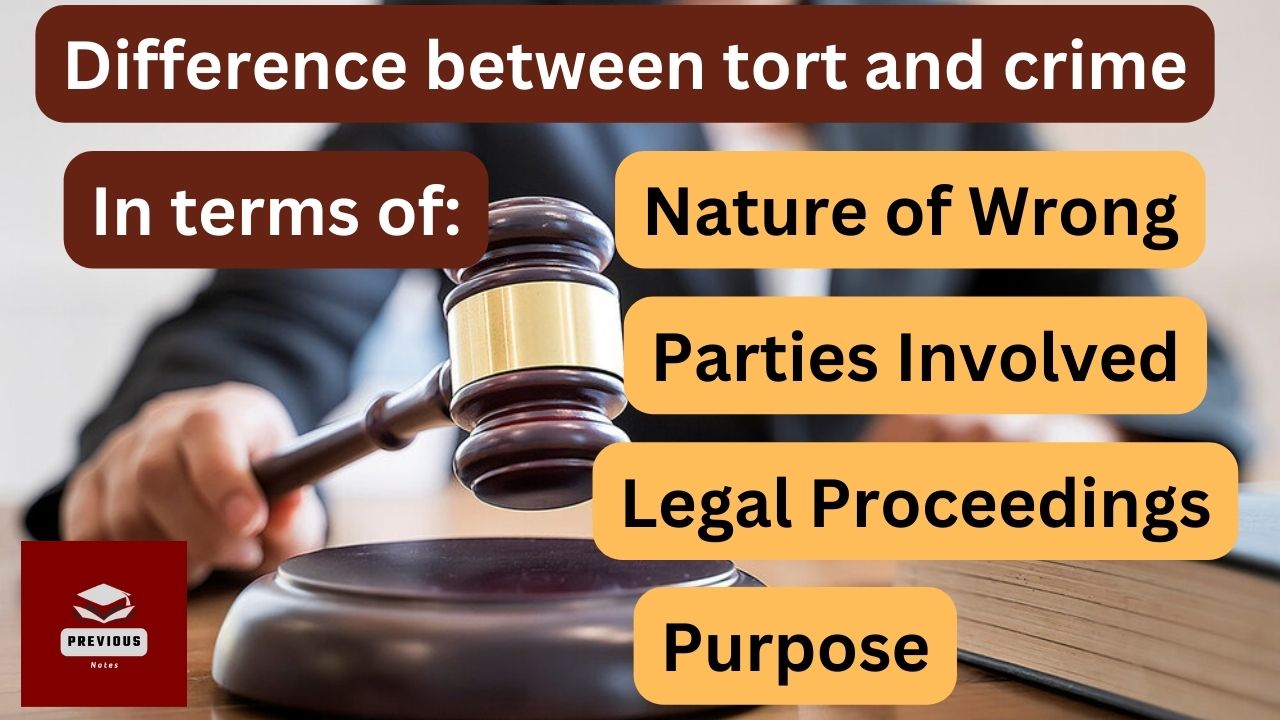Difference between tort and crime
Torts and crimes are both aspects of law that deal with wrongful acts, but main difference between tort and crime is in their nature, purpose, and the legal proceedings involved. Here are the key differences between torts and crimes:
1. Nature of the Wrong
Tort:
- A tort is a civil wrong. It involves a breach of a duty owed to another individual, leading to private legal action by the injured party.
- Examples include negligence, defamation, and trespassing.
Crime:
- A crime is a public wrong. It involves a breach of a duty owed to society as a whole, leading to prosecution by the state.
- Examples include theft, assault, and murder.
2. Purpose
Tort:
- The main purpose of tort law is to compensate the victim for the harm suffered. The goal is to restore the injured party to the position they were in before the tort occurred, primarily through monetary compensation (damages).
Crime:
- The main purpose of criminal law is to punish the wrongdoer, deter future wrongdoing, and protect society. Punishments can include imprisonment, fines, community service, and other penalties.
3. Parties Involved
Tort:
- The party bringing the case is the plaintiff (the injured party), and the party being sued is the defendant (the alleged wrongdoer).
crime:
- The party bringing the case is the state or government (prosecution), and the party being charged is the defendant (the accused wrongdoer).
4. Legal Proceedings
Tort:
- The case is adjudicated in a civil court.
- The burden of proof is on the balance of probabilities, meaning the plaintiff must show that it is more likely than not that the defendant is liable.
Crime:
- The case is adjudicated in a criminal court.
- The burden of proof is beyond a reasonable doubt, meaning the prosecution must prove the defendant’s guilt to such a level that there is no reasonable doubt.
5. Outcome
Tort:
- If the defendant is found liable, they are ordered to pay damages to the plaintiff.
- The outcome is aimed at compensating the victim.
Crime:
- If the defendant is found guilty, they are subject to penalties such as imprisonment, fines, probation, or community service.
- The outcome is aimed at punishment and deterrence.
6. Example Scenarios
Tort:
- If a person slips and falls due to a spill in a grocery store, they may sue the store for negligence to recover medical expenses and other losses.
Crime:
- If a person steals goods from a store, the state will prosecute the individual for theft, and if found guilty, the individual may face imprisonment or fines.
Conclusion:
In summary, while torts focus on compensating individuals for private wrongs, crimes focus on punishing individuals for public wrongs. The legal systems, burden of proof, and outcomes differ to reflect these purposes.
You May Also Like:
Indian Penal Code MCQs Quiz: Section 1 to 5
Indian Panel Code MCQs Quiz on Section 511 and Attempt
IPC MCQs Quiz on Sec. 76 and Sec. 79 | Quiz on Mistake
Practice IPC MCQs online for free (Section 78)
Practice IPC MCQs Quiz for free | Section 81 MCQs | Necessity
Practice IPC MCQs online for free : Infancy (section 82-83)
Practice IPC MCQs Quiz for free | Section 81 MCQs | Necessity
Practice IPC MCQs Quiz for free | Section 84 MCQs | Insanity
Practice IPC MCQs Quiz for free | IPC Section 85 MCQs | Intoxication
DOMESTIC VIOLENCE AS TORT | APPLICATION OF TORT LAW
Economic Tort | Business Tort: Application of Tort Law
Difference between intention and motive | In Tabular Format
Bolam Test | Bolam V. Friern Hospital Committee | Medical Negligence
Jacob Mathew V. State of Punjab Case Law | Medical Negligence
Medical Negligence in tort | Case Laws
Contributory Negligence | Law of Tort | Case Laws
Specific Principles of Criminal Law | LLM Previous Year Paper 2024 | CCSU
Specific Torts | LLM 4th Semester Previous Year Paper 2024 | CCSU
History and Basic Principles of Criminal Law | Previous Paper 2023
LLM Previous Year Paper 2023 | PRIVILEGED CLASS DEVIANCE
PENOLOGY PREVIOUS YEAR PAPER | LLM | CCSU
LLB Previous Year Paper 2023 | Constitutional Law II | CCSU
LLB Previous Year Paper 2023 | Legal and Constitutional History | CCSU
LLB Previous Year Paper 2023 | Jurisprudence II | CCSU
LLB Hindu Law Previous Year Paper 2023 | CCSU
LLB Hindu Law Previous Year Paper 2024| CCSU
Euthanasia in India, Right to die with Dignity
Right to Privacy Case Law Mr. X vs. Hospital Z
Federal Constitution Definition and key points
University of Madras vs. Shantabai,1954: Article 12 Case Law
Article 20 Fundamental Right with Case Laws
Article 19 Fundamental Right of Indian Constitution with 10 Case Laws
Article 358, 359 Fundamental rights during emergency
Parliamentary Privileges and Fundamental Rights with Case Laws
Article 14 Fundamental Right with Case Laws
Article 15 Fundamental Right with Case Laws
Article 12 Fundamental Right with Case Laws
DOMESTIC VIOLENCE AS TORT | APPLICATION OF TORT LAW
Crimes without Mens Rea? Statute without Mens Rea.
Definition of crime by various jurists, Criminology
Methods of Studying Criminology
All about Capital Punishment with Case Laws
IMPOSSIBLE ATTEMPT | ATTEMPT VS IMPOSSIBLE ATTEMPT
Difference between Preparation and Attempt
Tests to Determine Attempt and preparation | With Case Laws
Difference between intention and motive | In Tabular Format
Forms of Judicial Process: Adversarial & Inquisitorial
Crimes without Mens Rea? Statute without Mens Rea.


















Leave a Reply